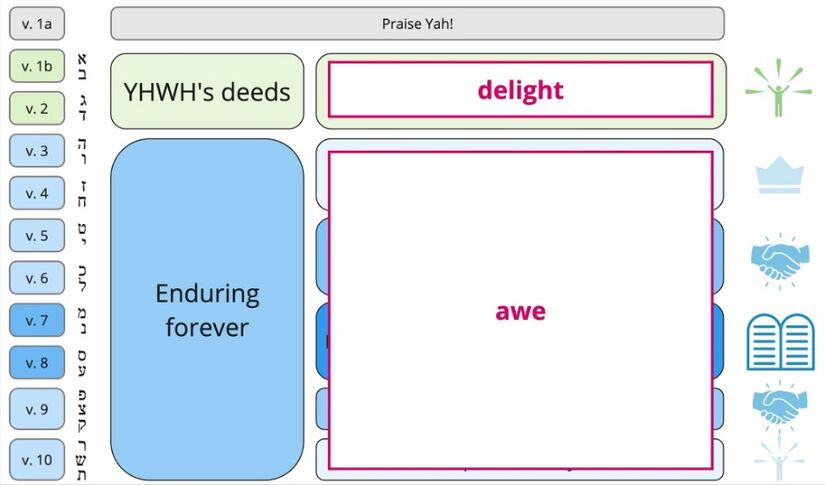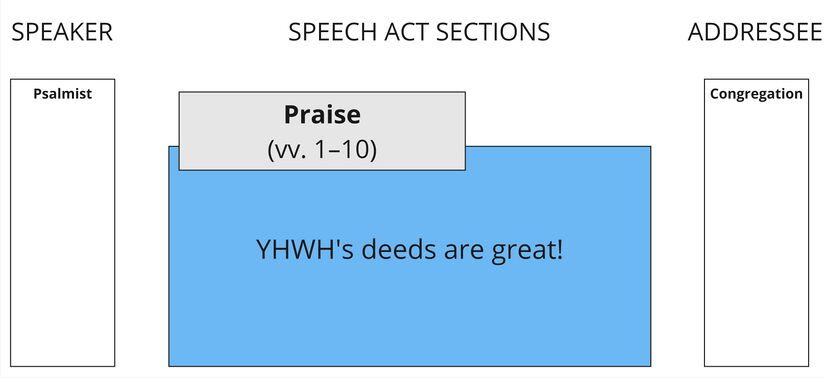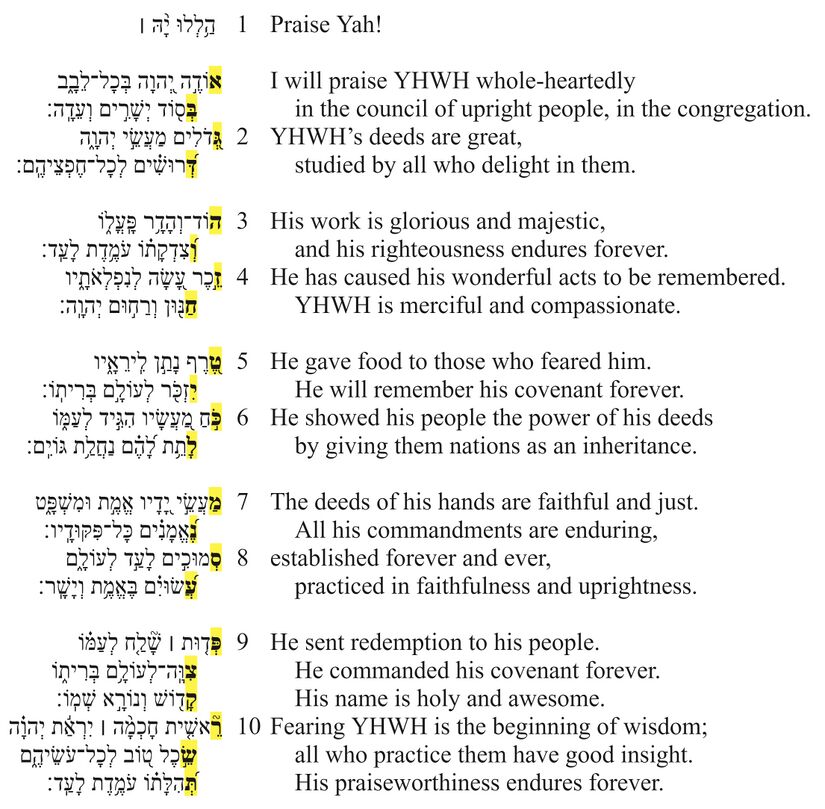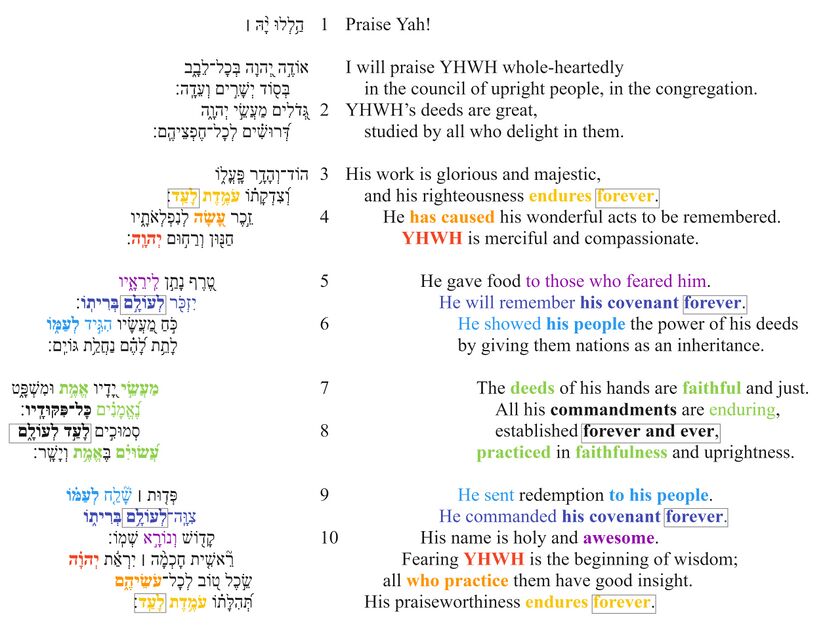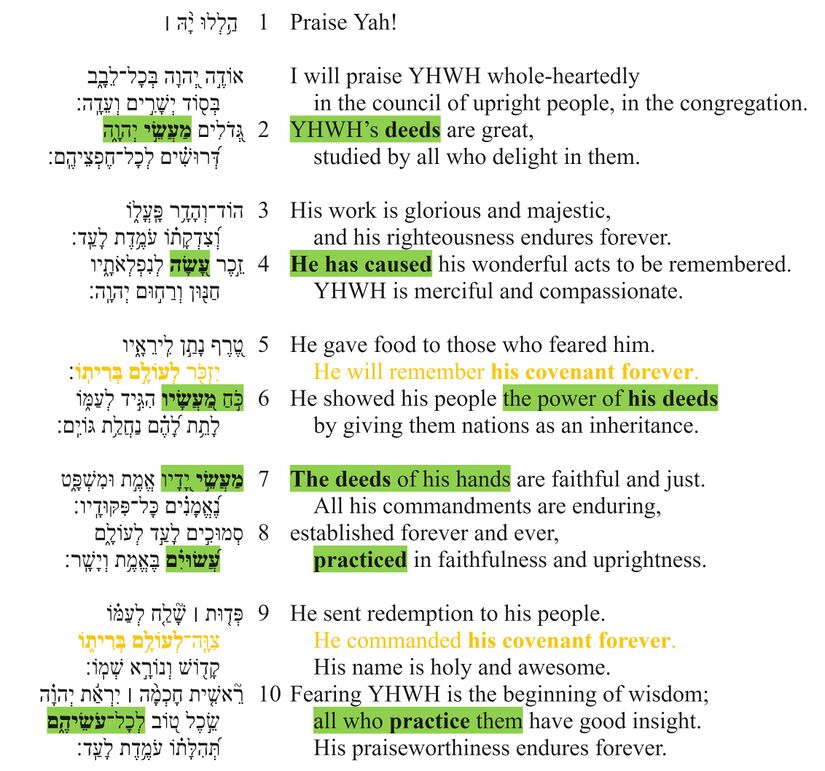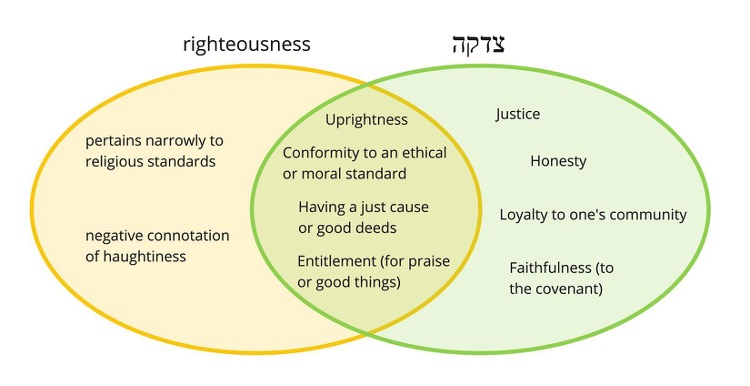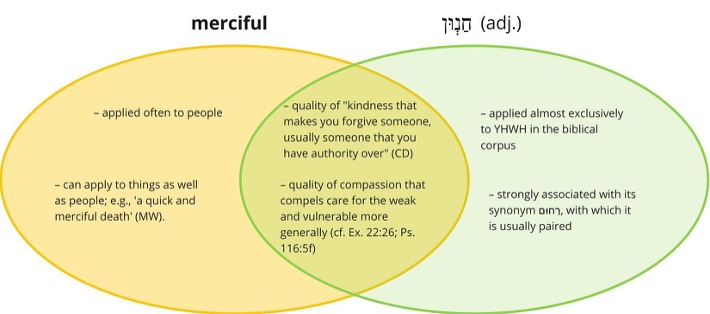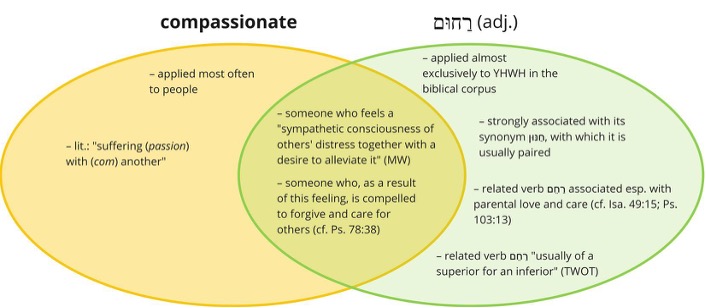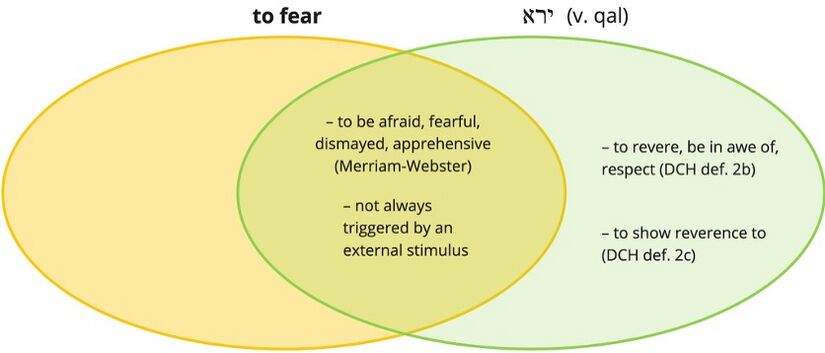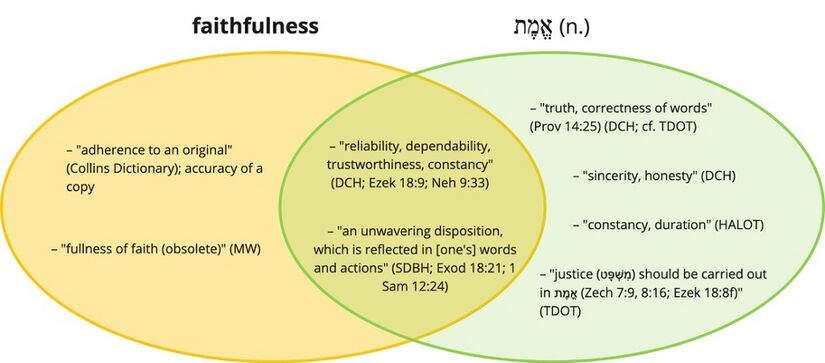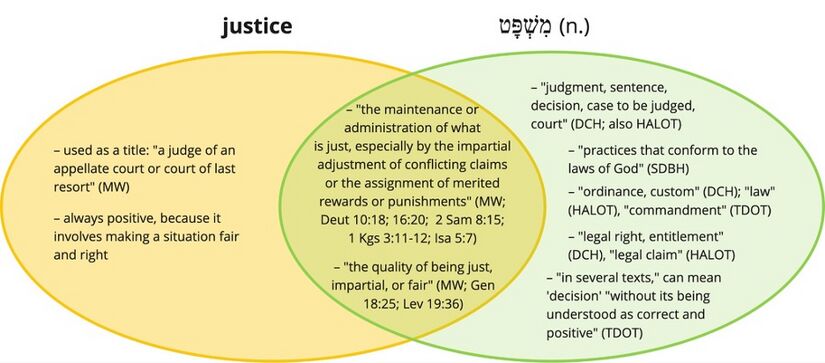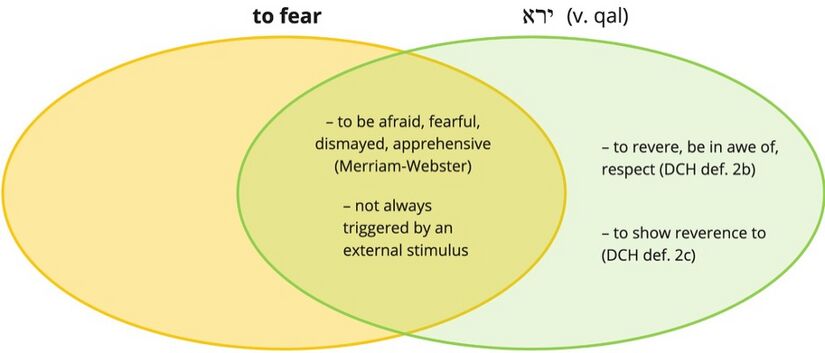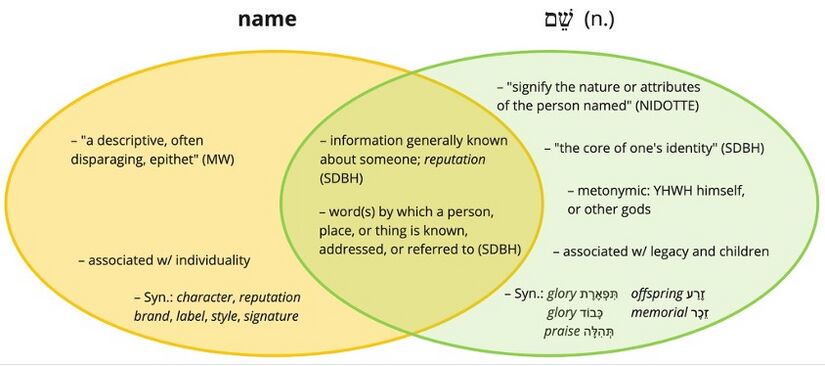Psalm 111 Translation
Guardian: Ryan Sikes
Jump to: Overview Verse-by-Verse
General Translation Tips
To translate poetry accurately and beautifully, a knowledge of both the source language's poetry and the target language's poetry is needed. So, here are the steps we recommend to follow when setting out to translate this or any psalm:
- Gain an Understanding of the Target Language’s Poetry/Arts. Research and analyze many examples from numerous genres of poetry, storytelling, and music in the target language and culture, and document findings. See our Local Arts Analysis Guide for help.
- Gain an Understanding of the Source Language’s (Hebrew) Meaning and Poetry. The aim of all our materials is to provide exactly this for the translator, poet/musician/artist, and consultant: an understanding of what the psalm means, as well as its poetics.
- Translate the Psalm in the Appropriate Local Art/Poetry Genre(s).
- Test the Translation with the Language Community. Seek feedback about both word choices and the form/genre/media of translation.
Overview: Psalm 111 as a Whole
These are the elements that we believe are most helpful to keep in mind during both drafting and checking translations, to help verify that the translation or performance is accurate beyond just a word- or verse-level; just as important is accuracy on the level of a whole. Additionally, these are elements that will guide decisions about performance in oral translations, songs, poems, or other kinds of art based on this psalm.
The following gives a basic Overview of the Psalm, answering the following questions:
- Title-what title best describes this unique psalm?
- "YHWH's deeds"
- Purpose–why was this psalm written?
This psalm was written to praise YHWH for his deeds of covenant faithfulness.
- Content–In summary, what is said in this psalm?
- YHWH's deeds are great and his commandments are enduring.
- Message–what is the general theme of this psalm? What seems to be the main point the psalmist wanted his audience to realize by hearing this psalm?
- YHWH, our God, has done great deeds for us, and, we his people, do his commandments.
- See Prominence Feature 2: Great Deeds for more detail.
Every psalm has a coherent story behind it. However, many
psalms are not written in typical "story" format, with a clear
beginning, middle, and end. Here, we attempt to understand the story and
background that prompted the psalmist to write.
- Story Behind-How do the various parts of the psalm fit together into a single, coherent story? What is the main message/theme conveyed by this "story behind"?
 YHWH promises to perform great deeds for his
people.
YHWH promises to perform great deeds for his
people.  The
people wait for YHWH to perform great deeds.
The
people wait for YHWH to perform great deeds.  As
they wait, the psalmist celebrates YHWH's great deeds of the past. YHWH's past
deeds always happened according to a pattern:
As
they wait, the psalmist celebrates YHWH's great deeds of the past. YHWH's past
deeds always happened according to a pattern:
- YHWH promised to perform great deeds for his people, then
- YHWH performed great deeds for his people, and then
- The people celebrated YHWH's great deeds and kept his commands.
- As he composes his psalm, the psalmist anticipates that the people will praise YHWH and keep his commands as they wait. Then YHWH will perform great deeds for his people, and the people will celebrate YHWH's great deeds.
- Background Situation-what are the series of events leading up to the time in which the psalm was written?
Knowing the layout of the psalm by sections helps us to understand the progression of thought as the poem progresses.
How to read the visual below: The picture below shows the main “chunks” or pieces of the poem. Verse numbers appear on the left. The second column has a title for each section. The large third column contains a brief summary of the section’s content. As you read through the content column, you will see important words and ideas highlighted in similar colors. The icons on the right may be used as memory aids.
Progression–what is the flow of thought as the poem progresses?
- Broadly speaking, this psalm is about YHWH's great deeds and character.
- The first major section, verses 1-2, is an introduction:
- the psalmist declares his intention to praise (verse 1)
- the psalmist introduces the theme of the poem (verse 2).
- The second major section, verses 3-10, contains the praise itself, focusing on:
- YHWH's character (verses 3-4)
- YHWH acts of covenant faithfulness (verses 5-6)
- YHWH's commandments (verses 7-8)
- how YHWH's people should respond to his great deeds (verses 9-10).
Part of poetry is communicating emotion. Each section, and even each verse, can contain a number of different emotions. Here are the main emotional themes of each section:
In poetry, it is important to keep track of who is speaking, who is the audience, and what it is that the speaker is trying to do with his words.
How to read the visual below: In the chart below, the left-hand column identifies the speaker, who is the psalmist. The right-hand column identifies the audience, who is the Congregation in this psalm. The middle column tells what the speaker is trying to do with his words (his speech acts) in each section.
In this section, we ask, "what kinds of artistic beauty did the psalmist incorporate into the poem to reinforce its message?" (See Poetic Features video and layer for more details.)
YHWH's Deeds from A to Z
Psalm 111 is an acrostic poem. In an acrostic poem, each line begins with a successive letter of the Hebrew alphabet (so is Psalm 112).
The alphabet is a symbol of completeness.<ref>See Gottwald 1954, 23-32; IVP Dictionary, “Acrostic”; Soll, Anchor Bible Dictionary; Watson, Classical Hebrew Poetry 2001.</ref> In an acrostic poem, the poet takes a topic and explains it carefully and completely, from every possible angle. The purpose is that the reader would gain a thorough, detailed understanding of the topic, so that he or she understands it “from A to Z.” In Psalm 111, the topic is "YHWH's deeds" (מַעֲשֵׂי יְהוָה).
Prominence–what words, phrases, or ideas are most important in this psalm?: It is also important to consider how the author chose to draw attention to certain parts of the psalm. Here are the parts of the psalm that we believe are most prominent, and thus should be most prominent in a performance of the psalm.
Prominence Feature 1: Eternal Commands
Verses 7-8 are the most prominent verses in the psalm. Within those verses, the words 'deeds/practice,' 'faithfulness,' and 'commands' are the most prominent words. We know this because this psalm contains a special structure called a chiasm that spans from verse 3b to verse 10c. In a chiasm, the first line and the last line share repeated or similar features, and then the second line and the second-to-last line share repeated or similar features, and so on. The lines that match in the middle are the focus of the chiasm (verses 7-8).
The middle of the chiasm contains the repeated Hebrew roots for deeds/practice (עשׂה) and faithful(ness) (אמת) in verses 7 and 8. So, Psalm 111 is a celebration of YHWH's faithful deeds. Although the psalm celebrates many of YHWH's deeds, the chiastic structure highlights one deed in particular: YHWH's commands (verse 7b).
The psalmist has placed the word "commands" at the center of the chiasm, he describes the commands with the phrase "forever and ever", and he makes the commands the subject of three consecutive verses (verses 7b–8b). Furthermore, the commands are surrounded by the threefold repetition of the root faithful(ness)/enduring (אמת/אמן). YHWH's commands are both given (by him) in faithfulness and they are to be done (by his people) in faithfulness.
Prominence Feature 2: Great Deeds
The root that means to do or deeds (עשׂה) occurs six times in Psalm 111 (verses 2a, 4a, 6a, 7a, 8b, 10b), one time in each section and twice in the fourth section. The first four occurrences refer to YHWH's deeds (verses 2a, 4a, 6a, 7a), and the last two occurrences refer to the deeds of YHWH's people (verses 8b, 10b).
The repetition functions to highlight the theme of the psalm, which is YHWH's deeds. But the repetition also functions to make a point about how people ought to respond to YHWH's deeds. By using the word twice with people as the agent, the psalmist shows that the proper response to YHWH's deeds of faithfulness is that his people perform deeds of faithful obedience in return. In short, the covenant relationship between YHWH and his people is to be characterized by doing (עשׂה).
Verse-by-Verse Notes (Translation)
View Text
Contents
Verses 1-2: YHWH's Deeds
- The first two verses of the psalm (with the exception of the superscription in verse 1a) form a section.
- These verses are not a part of the large chiasm of verses 3–10 that takes up most of the psalm (see Prominence Feature 1: Eternal Commands for more details).
- These verses have the word all (כל) at the beginning and end of the section (verses 1a, 2b).
- Together, these two verses serve as a kind of introduction to the psalm:
- in verse 1, the psalmist states his intention to 'praise YHWH', and
- in verse 2, the psalmist states the main theme of his praise: 'YHWH's deeds' (verse 2a) and the human response to them (verse 2b).
v. 1
| 1a | הַ֥לְלוּ יָ֨הּ ׀
|
Praise Yah!
|
| 1b | אוֹדֶ֣ה יְ֭הוָה בְּכָל־לֵבָ֑ב
|
I will praise YHWH whole-heartedly
|
| 1c | בְּס֖וֹד יְשָׁרִ֣ים וְעֵדָֽה׃
|
in the council of upright people, in the congregation.
|
Expanded Paraphrase The words in <i>italics</i> provide a fuller sense of the psalm; the text itself is in <b>bold</b>.
Notes
- The first line of this verse, praise Yah, is the superscription of Psalm 111. Superscriptions can identify the psalmist, the instruments, the tune, the setting, and other information. Here it is giving 'other information,' namely, it is a call to praise YHWH.
- We know that this line is a superscription because it does not fit in the acrostic structure of the rest of the psalm (see the Poetic Feature YHWH's Deeds from A to Z for more information).
- Yah is a shortened form of the proper name YHWH.
- Most English translations convey the meaning of the phrase by rendering it Praise the Lord! (ESV, NASB, NLT, etc.), and this is an acceptable option. But the CSB transliterates the phrase with the rendering Hallelujah!
- In many cultures, special words whose meanings are not immediately clear can take on the role of incantations, that is, words with magical properties. In Africa, for example, this is often a problem with transliterated words like hallelujah and amen. For this reason, we recommend a translation that brings out the meaning of the phrase, such as the Hausa CSB: Praise YHWH![1] or the French NBS: Praise the LORD (Yah)![2]
- In the second line of the verse, the phrase I will praise has several important features:
- The phrase I will praise gives the purpose of the psalm as a whole, which is to praise YHWH.
- The verb praise is an "action by which humans openly express recognition of what someone else has done or achieved."[3] Many translations render this word as thank (NLT, CEV, GNT) or give thanks (ESV, NET).[4] But praise is more appropriate in the context.[5]
- The verb form is first-person future tense, but in a form (a cohortative) that means the psalmist is expressing his strong desire and intention to praise YHWH.[6] For languages that lack this form (English lacks it), translators may render it as a first-person future tense verb.
- The Hebrew word for praise in the second line of this verse (ידה) is different from the word used in the first line (הלל). The two words are synonyms. The basic difference between the two is:
- "the word in the first line emphasizes 'acclaim of,' 'boasting of,' or 'glorying in' an object,
- the word in the second line emphasizes 'recognition' and 'declaration' of a fact, whether good or bad."[7]
- The word translated I will praise begins with the first letter of the Hebrew alphabet, alef (א). So, it starts the acrostic poem, in which each line begins with a successive letter of the Hebrew alphabet (Ps 112 is similar). For more detail, see YHWH's Deeds From A to Z.
- Most English translations render the divine name YHWH as LORD. However, translators should seek to be clear that the name here is the personal name for Israel's God, which distinguishes him from all other gods or lords. An example of a translation that does this is the Hausa CSB, which renders it Yahweh.
- The Hebrew phrase we have rendered whole-heartedly (בְּכָל־לֵבָב) is important to the emotional exegesis of this psalm. It means that the psalmist's emotionally positive act of praise is being done with the fullness of the psalmist's emotional energy. The phrase is also a figure of speech. English translations often render it as with all my heart. The phrase here might hint at the famous commandment to love YHWH with your whole heart (בְּכָל־לְבָבְךָ֥) (Deut 6:5).
- The phrase in the council of upright people, in the congregation has some important features:
- The word in denotes location. It only appears once in the Hebrew, before the word council (סוד). But, the word in relates to both the word council and and to the word congregation. So, most English translations supply it before congregation also.
- The Hebrew has a connecting word (often translated and) before the word congregation that many English translations retain (see NASB, NIV, CSB). However, this word may suggest to audiences that the council and the congregation are two different groups. They are not.[8] In English and some other languages, this connecting word is not entirely necessary and can be left out (ESV, REB, NRSV).[9]
- The council of upright people (סוֹד יְשָׁרִים) and the congregation (עֵדָה) probably refer to the same group of people.[10]
- The word council (סוֹד) "can be translated as 'circle.' It was the free meeting together in time of leisure of the adult men…where the news of the day [was] exchanged."[11] The Hausa CSB renders it public meeting.[12]
- The Hebrew word we have rendered upright people means "a person whose behavior is morally and ethically right."[13] The Hebrew word itself is an adjective, and most English translations render it as the upright (ESV, NASB, NIV, CSB, NRSV), but here it clearly refers to people, and translators should make this clear. The NLT has godly people, but translators should be careful when using such phrases, because in some languages the word godly may connote that the people are somehow themselves gods. The Hausa CSB renders this phrase honest people at heart.[14]
- Languages that lack distinct terms for each group can combine them into a single term in translation (such as the French NFC: the assembled faithful).[15]
v. 2
| 2a | גְּ֭דֹלִים מַעֲשֵׂ֣י יְהוָ֑ה
|
YHWH’s deeds are great,
|
| 2b | דְּ֝רוּשִׁ֗ים לְכָל־חֶפְצֵיהֶֽם׃
|
studied by all who delight in them.
|
Expanded Paraphrase The words in <i>italics</i> provide a fuller sense of the psalm; the text itself is in <b>bold</b>.
Notes
- Elsewhere in the Psalms, YHWH's deeds are described as very great (Ps 92:6) and bringing joy (Ps 92:5-6), and they are associated with his wonderful works (נפלאות, Ps 107:21-24; 139:14). They are done in wisdom (Ps 104:24), and they include his work of creating man (Ps 139:14), his work of sustaining creation (Ps 104:13, 24), and his work of rescuing his people (Pss 107:22, 24; 118:17), especially from Egypt (Ps 106:13).
- The word deeds is from the Hebrew root עשה, and this root is repeated throughout the psalm more than any other root. For more detailed information on this very prominent word, see Prominence Feature 2: Great Deeds. Most English translations render the word as works.
- Languages that require a verbal idea for this word can consider following the GNB: the things the Lord does.
- The word deeds is from the Hebrew root עשה, and this root is repeated throughout the psalm more than any other root. For more detailed information on this very prominent word, see Prominence Feature 2: Great Deeds. Most English translations render the word as works.
- The verb we have translated as studied (דרשׁ) has as its basic meaning to seek, and here it refers to an "action by which humans or deities make an intensive effort to obtain in-depth information about a certain object or event."[16]
- The thing being sought/studied is YHWH's deeds, which probably refers to YHWH's deeds as they have been recorded in written Scripture.[17] So, the gloss studied (ESV, NASV, NRSV) is appropriate here.[18] But in some languages, the idea of studying YHWH's deeds may be difficult. In this case, a possibility is pondered (NIV, Hausa CLB).[19] The verb does not mean to wait, and so the NET's eagerly awaited does not really fit.
- The clause in which this verb is found does not state the subject. The subject, which is YHWH's deeds, is found in the previous clause. If the target language requires the verb to have a subject, then translators may repeat the subject in the second clause, or supply a subject pronoun: YHWH's deeds are great, YHWH's deeds are studied… or YHWH's deeds are great, they are studied…
- The verb is in a passive form in Hebrew, but some languages may require an active form, such as all who delight in YHWH's deeds study them.
- The NLT renders the phrase all who delight in him should ponder them, and this is a possible interpretation of the verb form.[20] However, the context does not clearly indicate that the action of the verb study is not actually occurring in reality (that is, it does not clearly indicate that it is in the subjunctive mood). So, we have rendered the verb as though the deeds are actually studied.
- The fact that YHWH's deeds are studied by people (verse 2b) is evidence of the greatness of the deeds (verse 2a).
- The use of the word delight implies that the psalmist himself feels delight for YHWH's commands.
- The pronoun them in the phrase delight in them refers to YHWH's deeds.
Verses 3-10: YHWH's Deeds
- These verses form a chiasm. See Prominence Feature 1: Eternal Commands for more detail.
Verses 3-4
- Verses 3–4 are bound together as a subsection. There are two main reasons for this:
- Each clause/line in these verses is focused on the present: is... stands... has caused... is.
- Pairs of words praising YHWH appear at the beginning and end of the subsection: glorious and majestic (הוֹד־וְהָדָ֥ר, verse 3a) and merciful and compassionate (חַנּ֖וּן וְרַח֣וּם, verse 4b)[21]. It looks like this:
v. 3
| 3a | הוֹד־וְהָדָ֥ר פָּֽעֳל֑וֹ
|
His work is glorious and majestic,
|
| 3b | וְ֝צִדְקָת֗וֹ עֹמֶ֥דֶת לָעַֽד׃
|
and his righteousness stands forever.
|
Expanded Paraphrase The words in <i>italics</i> provide a fuller sense of the psalm; the text itself is in <b>bold</b>.
Notes
- In Hebrew, the word order of the first clause His work is glorious and majestic is actually glorious and majestic is his work. This is for two reasons:
- In Hebrew, the word glorious begins with the fifth letter of the Hebrew alphabet (ה), which is needed to continue the acrostic (see Poetic Features for more detail).
- This word order emphasizes the characteristics glorious and majestic. Several English translations imitate this word order (ESV, NASB, NIV, LEB, NRSV). But strangely, none of these translations imitate the parallel word order in verse 4b, which literally says merciful and compassionate is YHWH. We have reversed the order of both lines for a more natural-sounding translation, and this change may be necessary in many languages. But translators may wish to imitate the Hebrew word order in both lines in order to bring out the original emphasis on the characteristics.
- In the phrase his work, the pronoun his refers to YHWH. The singular noun work (פָּֽעֳלוֹ) is a collective; in other words, the word work does not refer to a single work, but to all works (plural) that YHWH does. Several translations render this phrase as a verbal idea, everything he does (NLT; see GNT, CEV, CSB, LUT, HFA, NGÜ). Other languages that require a verbal idea for such a phrase can imitate this translation.
- The words translated glorious and majestic (הוֹד־וְהָדָר) are actually nouns (glory and majesty, see verse 7a for a similar noun-pair). However, they are best translated into English as adjectives. These words are usually used in the Bible to describe kings[22]
- Bratcher and Reyburn point out that in some languages, it may be difficult to describe YHWH's deeds with abstract qualities like glorious and majestic. In such cases, a statement like His works reveal (or demonstrate) his glory and majesty may be more natural[23]
- Additionally, some languages may need to render these two words as verbs. Bratcher and Reyburn suggest show how people respect him and that he is powerful like a king[24]
- The word righteousness is a key term that means a "pattern of behavior of humans or deities that is in accordance with the requirements of the divine law and generally aimed at establishing or restoring this pattern as a standard, which in certain cases requires a victory over evil and results in prosperity and happiness."[25] Like glory and majesty, righteousness is an especially important quality for a king[26]
- Bratcher and Reyburn suggest that for certain languages, a possible substitute may be he is good to people. The problem with this rendering, however, is that it connotes favor or generosity, which is not the same thing as righteousness. For languages that need to express the idea in a phrase, something like he does what is right may be better.
- The following diagram compares the Hebrew term with the English word righteousness. Definitions in the yellow left side apply only to the English word, while definitions in the green right side apply only to the Hebrew word. Definitions in the middle, where the shapes overlap, apply to both the English and Hebrew words:
- In some languages, an abstract noun like righteousness cannot perform the action of standing. So, for example, the Hausa CLB says is certain/confirmed/lasting forever[27]
v. 4
| 4a | זֵ֣כֶר עָ֭שָׂה לְנִפְלְאֹתָ֑יו
|
He has caused his wonderful acts to be remembered.
|
| 4b | חַנּ֖וּן וְרַח֣וּם יְהוָֽה׃
|
YHWH is merciful and compassionate.
|
Expanded Paraphrase The words in <i>italics</i> provide a fuller sense of the psalm; the text itself is in <b>bold</b>.
Notes
- In Hebrew, the first line of this verse literally says He made/did a remembrance of his wonders.
- The word translated to be remembered is actually a noun in Hebrew (זֵכֶר). Most translations, however, rightly render this as a verbal phrase: He has caused his wonders to be remembered (NIV, see also ESV, NLT). We have rendered the word as a verbal idea also.
- The word to be remembered is in a verb form (the Hiphil) that is usually translated as causal: has caused…to be remembered. However, the sense here is not so much that YHWH is forcing people to remember[28] or giving them permission to remember; instead, he is providing them with the means and opportunity to remember.
- So, other translation possibilities include the French NBS: he has fixed the memory of his amazing deeds (Il a fixé le souvenir de ses actes étonnants) or the French Louis Segond: he left the memory of his wonders (Il a laissé la mémoire de ses prodiges; see also NVI, S21).
- Another way to express the idea of caused…to be remembered is he has gained renown (NRSV; see REB), although this translation does not communicate that YHWH was the one who created the conditions so that the remembrance or renown would happen.
- Languages in which the passive voice is difficult may consider rephrasing the line as He caused opportunities for people to remember his wonderful acts.
- The remembrance which YHWH made is probably the record of his deeds in written Scripture.
- The verb in this line he has caused (עָשָׂה) is in the past tense (it is a qatal form):
- Some translations render the verb in the present tense, such as he causes us (NLT). This is not preferred[29]
- It is probably best rendered in English as he has caused (a present perfect, see NIV, ESV) and not he caused, since the remembrance of YHWH's wonderful acts continues up to the time of speech. However, many languages lack a present perfect tense. In such cases, the simple past tense is better than the present tense; for example, the Hausa CLB says he made his wonderful deeds remembered[30]
- The NET translation says he does amazing things that will be remembered. This rendering has two main issues:
- While the verb (עשה) can mean to do, the Hebrew form here demands a past tense rendering.
- The wonderful acts/amazing things are probably not the object of the verb to cause/to do (עשה). This is because the phrase his wonderful acts is in a form that means it most likely indicates the thing being remembered,[31] not the thing being caused/done. Instead, the object of the verb to cause/to do is remembrance.
- The word translated to be remembered is actually a noun in Hebrew (זֵכֶר). Most translations, however, rightly render this as a verbal phrase: He has caused his wonders to be remembered (NIV, see also ESV, NLT). We have rendered the word as a verbal idea also.
- The combination of the words merciful and compassionate occurs frequently in the OT, though sometimes the words occur in the opposite order (compassionate and merciful). They are almost always a description of YHWH. These two words occur far more often together than they do apart.
- YHWH's merciful and compassionate character was the basis for the renewal of the covenant in Exodus 34. Here in Ps 111, then, the reference to these two words probably caused the original audience of this psalm to think about how YHWH sustains and renews the covenant with his people[32]
- The Hebrew adjective we have rendered as merciful (חַנּ֖וּן) means a "state in which deities are favorably disposed to someone," or it means when people experience "an emotion of compassion towards other people, and acting accordingly."[33] The Hebrew adjective we have rendered as compassionate (רַח֣וּם) means a "state in which deities feel compassion for humans, which is usually translated into action."[34]
- When a person is 'merciful,' it denotes that he or she is in authority, and has the power to forgive someone. 'Compassionate' does not carry this sense; instead, the word stresses the person's feeling of sympathy for those who are in distress.
- The following diagrams compare the English words merciful and compassionate with the underlying Hebrew terms for each word. In each diagram, definitions in the yellow left side apply only to the English word, while definitions in the green right side apply only to the Hebrew word. Definitions in the middle, where the shapes overlap, apply to both the English and Hebrew words:
Verses 5-6
- Whereas all of the clauses in verses 3–4 are focused on the present (is... endures... has caused to be remembered... is), the clauses in verses 5–6 are focused on YHWH's past actions (vv. 5a, 6ab) and their future implications (v. 5b).
- The verb give (נתן) is a repeated root in this section, occurring in the first and last line:
- YHWH gave his people food (v. 5a), and he gave his people the promised land (v. 6b); these generous acts demonstrate his covenant faithfulness (v. 5b) and his power (v. 6a).
v. 5
| 5a | טֶ֭רֶף נָתַ֣ן לִֽירֵאָ֑יו
|
He gave food to those who feared him.
|
| 5b | יִזְכֹּ֖ר לְעוֹלָ֣ם בְּרִיתֽוֹ׃
|
He will remember his covenant forever.
|
Expanded Paraphrase The words in <i>italics</i> provide a fuller sense of the psalm; the text itself is in <b>bold</b>.
Notes
- This psalm contains many references to events from the Exodus-Conquest story (see the notes on verses 6 and 9ab). So, the giving of food in verse 5 probably refers to the time when YHWH fed his people with manna and quail in the wilderness[35]
- So, although the noun used here for food (טֶרֶף) sometimes refers to a prey, here it probably refers more generally to food. Therefore, the KJV rendering meat is not preferred, since the manna in the wilderness was not animal meat.
- Several modern translations render the word gave (נתן) with a present/timeless verb: he gives/provides food."[36] However, grammatically speaking, the Hebrew verb form used here is more likely past perfective: he gave[37] Rendering the verb in the present tense obscures the likely reference to the Exodus story in this verse, so it is not recommended.
- The Hebrew word we have translated those who feared is from the root to fear (ירא). The Hebrew word to fear means not just being afraid, but also includes being in awe of and having reverence for. So, the GNB renders the word those who honour him. The same Hebrew root also occurs in verses 9 and 10. See the diagram below for a comparison of the English and Hebrew terms:
- The phrase he will remember his covenant forever has some important features:
- While remembering the covenant is not the same thing as acting upon the covenant, the fact that YHWH will remember his covenant forever means that his people can trust that at some point in time, he will act upon it.
- The verb remember means the "process in which information that is stored in one's mind regarding someone or something is being reprocessed continually and/or repeatedly."[38] The use of the word here does not mean that God had forgotten the covenant and needed to be reminded of it. Rather, the opposite is true: God has never forgotten, and he will not forget. So, the NRSV says he is ever mindful and the NET has he always remembers.
- The past-tense clause in verse 6a (he gave) is followed by a future-tense clause in verse 6b: he will remember his covenant forever (see NASB)[39] Alternatively, it might be that the second line (verse 6b) is in some sense subordinate to the first (verse 6a), which would result in rendering the verbs in this verse as: he gave food… remembering his covenant…
- So, it is also possible to render the verb he will remember as a simple present tense verb, as most English translations do (he remembers, ESV, NIV, CSB).
- The verb he will remember is from the same root as the Hebrew noun remembrance in verse 4a.
- The covenant referred to here is probably the covenant with Abraham, Isaac, and Jacob[40]
- A covenant is "a solemn agreement between two or more parties (persons, groups, nations, deities) with stipulations, blessings, and curses."[41] This key term appears throughout the Bible, and translators should be consistent in the way they render it. The Hausa CSB renders it with the word for agreement[42]
- The provision of food in the wilderness (verse 6a) was one historical expression of YHWH's covenant remembrance.
v. 6
| 6a | כֹּ֣חַ מַ֭עֲשָׂיו הִגִּ֣יד לְעַמּ֑וֹ
|
He showed his people the power of his deeds
|
| 6b | לָתֵ֥ת לָ֝הֶ֗ם נַחֲלַ֥ת גּוֹיִֽם׃
|
by giving them nations as an inheritance.
|
Expanded Paraphrase The words in <i>italics</i> provide a fuller sense of the psalm; the text itself is in <b>bold</b>.
Notes
- The Hebrew word we have rendered he showed (הִגִּ֣יד) normally refers to spoken communication, which is why the NET renders it he announced[43] However, here it probably refers to a non-verbal demonstration, and so he showed is the preferred rendering[44] This is also the rendering found in most English translations. For a detailed discussion of our reasoning, see The Syntax and Meaning of Ps. 111:6.
- The phrase the power of his deeds means the power that characterizes his deeds or the power that is the source of his deeds. In some languages, it may be necessary to make this meaning clear. Possible renderings also might be how powerful his deeds are or that his deeds are powerful.
- In some languages, the word deeds may need to be expressed as a verbal idea, such as what he does or what he did.
- We have translated the opening phrase of the second line as by giving, because the second line specifies the way in, or means by, which YHWH demonstrated the strength of his works: “by giving them nations as an inheritance”.
- Though our English translation of the verb giving may seem as though the underlying Hebrew verb is a participle, the Hebrew form is called the infinitive construct, which here expresses the way something happens. Other languages have their own methods for specifying the way something happens. For example, in Hausa, the construction combines the phrase for through or by with the shortened verbal root[45]
- The NET renders the phrase as simply giving, so that the second line specifies the content of the announcement. However, since the verb of verse 6 most likely refers to non-verbal communication, it is unlikely that the second line provides the content of an announcement.
- The pronoun them in the second line of the verse refers to his people in the first line.
- The phrase we have rendered nations as an inheritance literally means inheritance of nations (נַחֲלַת גּוֹיִם).
- The word inheritance refers to the custom of receiving property through the division of an estate when a father dies. The Biblical authors used this custom as a figure of speech "for the division of the promised land among the descendants of Israel/Jacob."[46] The figure of speech relies on YHWH's role as father of his people (see Deut 32:6; Exod 4:22ff; Isa 64:7; Jer 3:4, 31:9; Hos 11:1). However, the metaphor should not be pressed too far to mean that it implies that YHWH dies so that his people can receive their inheritance. Although a normal inheritance has the meaning that the father dies, when the word is used as a metaphor for the portion that the Israelites would receive, the Bible never suggests the death of YHWH. Translators should therefore be careful to ensure that their rendering of this word does not necessitate or emphasize a death.
- The inheritance in this phrase refers to land. Several English translations make this clear by rendering the phrase as the lands of other nations (NIV, NLT; see also NET, GNB: the lands of foreigners). A benefit of rendering the word 'inheritance' as lands is that it avoids the difficulties that some cultures may have with YHWH giving an inheritance to people.
- Some languages may require a verbal phrase to communicate the meaning, such as giving them the nations to inherit them.
- The word nations here refers to the foreign nations that were neighbors of the people of God.
- The word inheritance refers to the custom of receiving property through the division of an estate when a father dies. The Biblical authors used this custom as a figure of speech "for the division of the promised land among the descendants of Israel/Jacob."[46] The figure of speech relies on YHWH's role as father of his people (see Deut 32:6; Exod 4:22ff; Isa 64:7; Jer 3:4, 31:9; Hos 11:1). However, the metaphor should not be pressed too far to mean that it implies that YHWH dies so that his people can receive their inheritance. Although a normal inheritance has the meaning that the father dies, when the word is used as a metaphor for the portion that the Israelites would receive, the Bible never suggests the death of YHWH. Translators should therefore be careful to ensure that their rendering of this word does not necessitate or emphasize a death.
Verses 7-8
- The third subsection is the most clearly defined. This subsection is formed by:
- repetition of the Hebrew root meaning faithful/faithfulness/enduring (אמן) in verses 7a, 7b, 8b
- repetition of passive participles (enduring, established, and practiced) in verses 7b, 8a, 8b
- the fact that all his commandments is the subject in three of the four lines (vv. 7b, 8a, 8b)
- the subsection is framed, like verses 3–4, by pairs of words: faithful and just (v. 7a) and faithfulness and uprightness (v. 8b).
- The subsection looks like this:
v. 7
| 7a | מַעֲשֵׂ֣י יָ֭דָיו אֱמֶ֣ת וּמִשְׁפָּ֑ט
|
The deeds of his hands are faithful and just.
|
| 7b | נֶ֝אֱמָנִ֗ים כָּל־פִּקּוּדָֽיו׃
|
All his commandments are enduring,
|
Expanded Paraphrase The words in <i>italics</i> provide a fuller sense of the psalm; the text itself is in <b>bold</b>.
Notes
- The phrase the deeds of his hands means the things that his hands have done or the things he did with his hands. In Scripture, YHWH does not have physical hands; rather, YHWH's hands are an image that generally represents his power, including his power to create, to protect his people or to win in battle. The references to the provision of food in the desert in verse 5 and to the conquest in verse 6 suggest that the deeds in verse 7 include providing for his people and fighting for them in battle.
- In languages "where it is possible to keep the imagery of God’s hands, it should be done."[47]
- In languages that require a verbal idea, a rendering like the actions that his hands have done or what he has done with his hands may be appropriate.
- For languages that cannot express that God has hands, an alternative might be to follow the GNB: In all he does is faithful and just[48] or the French PDV: He always acts with truth and justice[49]
- The words translated faithful and just are actually nouns in Hebrew: faithfulness and justice (see the note on glorious and majestic in verse 3a).
- The word faithful (אֶמֶת) refers to a "state in which humans and deities are considered worthy of trust, because they are truthful and committed, with an unwavering disposition, which is reflected in their words and actions."[50]
- The following diagram shows the similarities and differences between the English word faithfulness and the Hebrew word. Definitions in the left yellow part apply only to the English word, and definitions in the right green part apply only to the Hebrew word. Definitions in the middle, where the colors overlap, apply to both the English and Hebrew words:
- The word faithful (אֶמֶת) refers to a "state in which humans and deities are considered worthy of trust, because they are truthful and committed, with an unwavering disposition, which is reflected in their words and actions."[50]
- The Hebrew word we have rendered just (מִשְׁפָּט) often refers to judgment or rules, but here it refers to justice, since it is coupled with the abstract word faithful (see NET, NIV, ESV, GNT). The word primarily describes "practices that conform to the laws of God."[51] These practices are therefore "impartial, fair" and show "conformity to truth, fact, or reason."[52]
- The following diagram shows the similarities and differences between the English word justice and the Hebrew word. Definitions in the left yellow part apply only to the English word, and definitions in the right green part apply only to the Hebrew word. Definitions in the middle, where the colors overlap, apply to both the English and Hebrew words:
- The Hebrew word we have rendered just (מִשְׁפָּט) often refers to judgment or rules, but here it refers to justice, since it is coupled with the abstract word faithful (see NET, NIV, ESV, GNT). The word primarily describes "practices that conform to the laws of God."[51] These practices are therefore "impartial, fair" and show "conformity to truth, fact, or reason."[52]
- Commandments (פִּקּוּדִים) are "rules regulating behavior."[53]
- The pairing of the lines in verse 7 suggests that YHWH's commandments (verse 7b) are also included among the deeds of his hands (v. 7a).
- The commandments occur at the center of the chiasm that spans verses 3–10 (see Prominence Feature 1: Eternal Commands for an explanation).
- By placing the commandments at the center of the chiasm and making them the subject of three consecutive verses (verses 7b–8b), the commandments receive special prominence within the psalm. Furthermore, the commandments are surrounded by the threefold repetition of the Hebrew root that means faithful/faithfulness (אמן). YHWH's commands are both given (by him) in faithfulness and they are to be done (by his people) in faithfulness.
- The word we have rendered as enduring has as its basic meaning "to be firm, trustworthy, safe."[54] English translations render it trustworthy (ESV, NIV, NLT, CSB, REB, NRSV), reliable (LEB, NET), or dependable (GNB). However, the word can also mean enduring in the Hebrew form of the word found here, and this word is most likely in parallel with verse 8a, which is clearly about a long duration of time[55] So, we prefer the rendering enduring.
- Some languages may not be able to use these kinds of adjectives to describe a concept like YHWH's commandments. For example, the Hausa CSB renders it a thing of support/leaning, in other words, a reliable/dependable thing[56]
v. 8
| 8a | סְמוּכִ֣ים לָעַ֣ד לְעוֹלָ֑ם
|
established forever and ever,
|
| 8b | עֲ֝שׂוּיִ֗ם בֶּאֱמֶ֥ת וְיָשָֽׁר׃
|
practiced in faithfulness and uprightness.
|
Expanded Paraphrase The words in <i>italics</i> provide a fuller sense of the psalm; the text itself is in <b>bold</b>.
Notes
- This verse is not its own separate sentence, but rather continues the thought that began in verse 7b. Verse 8 explains why 'All his commandments are enduring': it is because they are established forever and ever, and therefore they are 'practiced in faithfulness and uprightness' by YHWH's people. Translators may need to make the logical connections represented by the words because and so clear in the local language.
- For languages that lack the passive voice, translators may consider adding a subject and object to each of the clauses in this verse, and rendering the verb in the active voice: he established them forever and ever, his people practice them in faithfulness and uprightness.
- The Hebrew word we have rendered as established has lean[57] in the sense of support or sustain as its basic meaning[58]
- This explains the wide variety of English translations of the word: (are) established (ESV, CSB, NRSV, NIV), are upheld (NASB), are steadfast (NIV84), are…true (NLT), they last (GNB), are sustained (LEB), are…firm (NET).
- The Hausa CLB renders it are certain from a root that means confirmed[59]
- The interpretation of verse 8b is difficult. The main question is whether the word we have translated practiced (עֲשׂוּיִם) means practiced (by people) or enacted (by YHWH). In short, the word practiced comes from the root עשה which means to do, and what is being done is the commandments from verse 7. To do (עשה) a command in the Bible usually means to obey it or practice it, not to enact it[60] So, the phrase here means practiced (by people). This is the meaning found in the ESV, NASB, NLT, NET, and NRSV[61]
- Translators may find that they need to include the adverbial phrase by people in order to make this meaning clear.
- For a detailed discussion, see The Text, Grammar, and Meaning of Ps. 111:8b.
- The prepositional phrase in faithfulness and uprightness refers to the manner in which people practice YHWH's commandments. It is not enough for people to simply practice the commandments; they must do so with the proper attitude and sincerity. This is similar to the psalmist's call in verse 1 to praise YHWH 'whole-heartedly.'
- The word faithfulness is the same Hebrew word we translated as faithful in verse 7a. Here it functions as a noun, while in verse 7a it is best to translate it in English as an adjective. Translators should consider using words in the local language that share the same root to render these words in both verses.
- The word uprightness is the same root word as upright people in verse 1. Here also, translators should attempt to use words that share the same root in the local language in both verses.
Verses 9-10
- The fourth subsection of verses 3–10, which is verses 9–10, is united by:
- being the only pair of verses in the psalm that contains 3 lines in each verse.
- the repetition of the root fear (ירא) at the end of verse 9 and the beginning of verse 10.

- The theme of this subsection is how YHWH's people ought to respond to his great deeds.
- This theme was anticipated by the last line of the previous section, which talks about how the people practiced his commandments in faithfulness and uprightness.
- Verse 9 details how YHWH redeemed his people and gave them his commandments, so that his name is awesome (feared). This implies that YHWH's people should fear him because of what he has done.
- Verse 10 explains what it means to respond to YHWH in fear (v. 10a), to obey his commandments (v. 10b), and the praiseworthiness (v. 10c) of YHWH implies a call to praise him.
v. 9
| 9a | פְּד֤וּת ׀ שָׁ֘לַ֤ח לְעַמּ֗וֹ
|
He sent redemption to his people.
|
| 9b | צִוָּֽה־לְעוֹלָ֥ם בְּרִית֑וֹ
|
He commanded his covenant forever.
|
| 9c | קָד֖וֹשׁ וְנוֹרָ֣א שְׁמֽוֹ׃
|
His name is holy and awesome.
|
Expanded Paraphrase The words in <i>italics</i> provide a fuller sense of the psalm; the text itself is in <b>bold</b>.
Notes
- The word redemption (פְּדוּת) means a "causative action by which deities help humans out of a dangerous, life-threatening, or otherwise difficult situation."[62] The word evokes the Exodus story and the redemption from Egypt. According to the Semantics of Ancient Hebrew Database, the word "means '(action or power of) redemption' and always refers to divine activity... Its main connotations, in addition to liberation, are powerful action and the context of an exclusive relationship."[63]
- The idea of sending redemption may not make sense in some languages, and translators should use proper local syntax to express the meaning here. Some examples of possible translations are he provided redemption (NIV), he has granted deliverance (French BDS),[64] he set his people free (GNB, French PDV), he delivered his people (NET), God gave freedom to his people (Spanish DHH)[65]
- Some translations take this to refer to payment of a ransom (NLT, Spanish NVI). However, the Hebrew word here does not necessarily include a payment[66]
- The idea of sending redemption may not make sense in some languages, and translators should use proper local syntax to express the meaning here. Some examples of possible translations are he provided redemption (NIV), he has granted deliverance (French BDS),[64] he set his people free (GNB, French PDV), he delivered his people (NET), God gave freedom to his people (Spanish DHH)[65]
- After YHWH redeemed his people from Egypt, he commanded his covenant. Thus, the first two lines of this verse reflect the progression of the story told in Exodus. The idea of commanding a covenant probably refers to commanding that a covenant be kept. The NET translation captures this sense well: he ordained that his covenant be observed[67] The Hausa CSB says he established his agreement[68]
- The key term holy is commonly misunderstood to mean the opposite of unrighteous/evil. However, it actually refers to the opposite of common/everyday.
- The word does not strictly mean "righteous, but simply set apart, different, distinct. In the Bible this is one of the primary attributes of God…he is set apart from all other[s]; he is unique. There is no one like him in heaven and on earth."[69] This also means that "He cannot be associated with anything that is in any way profane or tainted by sin or other impurities."[70]
- Thus, the word holy functions as a cover term for the wonderful uniqueness of God in all of his attributes: "God is eternal, and no one else is…God is omniscient, and no one else is. God is righteous, and while we may have moments of righteousness, we are not like him-he is different. God is all powerful, and we are not."[71]
- The word we have translated as awesome (נוֹרָא) comes from a root (ירא) that is often translated as to fear. However, this word in Hebrew means more than inspiring fear, and so causing people to be afraid should not be the primary sense conveyed in translations of this word. It also refers to inspiring reverence, awe, and respect. The following diagram compares the English word fear with the Hebrew root:
- In the next verse, the psalmist speaks of fearing YHWH. The word fearing in that phrase shares the same Hebrew root as the word awesome here in verse 9. Thus, an emotion evokes an action: YHWH is awesome, and that inspires his people to fear him, to be in awe of him, to respect him, and revere him. Translators should seek to render both the terms awesome and fearing[1] [2] [3] [4] with words that capture the full sense of the underlying Hebrew word. Translators are also encouraged to use the same root word in the local language to translate both words, if doing so can capture the sense of awe, reverence, and respect in both cases.
- In ancient Hebrew culture, a name signified someone's character, attributes, and identity. This meaning is quite different from the understanding of the English word 'name' as it is used in Western cultures today. The following diagram compares the English word name with the Hebrew word (shem: שֵם):
v. 10
| 10a | רֵ֘אשִׁ֤ית חָכְמָ֨ה ׀ יִרְאַ֬ת יְהוָ֗ה
|
Fearing YHWH is the beginning of wisdom;
|
| 10b | שֵׂ֣כֶל ט֭וֹב לְכָל־עֹשֵׂיהֶ֑ם
|
all who practice them have good insight.
|
| 10c | תְּ֝הִלָּת֗וֹ עֹמֶ֥דֶת לָעַֽד׃
|
His praiseworthiness stands forever.
|
Expanded Paraphrase The words in <i>italics</i> provide a fuller sense of the psalm; the text itself is in <b>bold</b>.
Notes
- For important detail and guidance on translating the word fearing, see the notes on the word awesome in verse 9. Practically speaking, fearing YHWH (verse 10a) means obeying YHWH's commandments (verse 10b).
- Some languages may require the concept of fearing to have an explicit subject. One possible rendering of the line in such cases is when people fear YHWH, it is the beginning of wisdom.
- Furthermore, in some languages, the idea of the beginning of wisdom may need to be expressed as a verbal idea, such as When people fear YHWH, they begin to be wise or People who respect the Lord are beginning to be wise people[72]
- The word them in verse 10b has been a source of confusion, because it is not immediately clear what the word refers to.
- In short, the pronoun probably refers to the commandments in verse 7b. Although commandments in verse 7b is rather far from the suffix them in verse 10b, there are good reasons why they should be considered the subject:
- The commandments are very prominent within this psalm (see Prominence Feature 1: Eternal Commands for more detail).
- In translation, it may be helpful to make the reference clear by replacing the pronoun them with the word that the translators used for commandments in verse 7b. English translations that do this include the NASB, NLT, GNB, NIV, NET, and CSB.
- In short, the pronoun probably refers to the commandments in verse 7b. Although commandments in verse 7b is rather far from the suffix them in verse 10b, there are good reasons why they should be considered the subject:
- The word we have rendered practice comes from the Hebrew root (עָשָׂה) that appears the most frequently in this psalm. Its most basic meaning is to do. See Prominence Feature 2: Great Deeds for more information. Just as YHWH has done wonderful deeds, so too his people should respond with good deeds of their own.
- We have chosen the word 'practice' because it connotes intentional and regular activity, which is fitting for the way that YHWH expects his commandments to be performed. The verb to do, by contrast, could mean actions that are unintentional or performed only on occasion.
- While the Hebrew phrase we have translated as good insight (שֵׂכֶל טוֹב) can refer to either insight (see Prov 13:15) or success (see Prov 3:4), both ancient and modern translations generally agree that the phrase here in Ps 111:10 means good insight. Many English translations rightly render the phrase as good understanding (ESV, NASB, NIV, NRSV).
- The phrase does not merely refer to raw intelligence or understanding that could be used for selfish or evil purposes. The insight involves good discernment and good moral judgment[73] A translation that makes this clear is the NET: good moral insight.
- Most English translations render the word praiseworthiness (תְּהִלָּה) in verse 10 as praise (KJV, ESV, NLT, NIV, NET). But such a rendering results in the awkward English phrase his praise endures forever, which even for native English speakers does not communicate the intended meaning that the praise given to YHWH by people endures forever or that YHWH deserves to be praised by people forever.
- Praiseworthiness is the preferred gloss of this word here, in which it means a "state in which humans or deities are considered worthy of praise."[74] This is the sense of the word in Psalms 35:28; 79:3; 102:22; 106:2.
- This interpretation of the word makes the best sense in the context: YHWH will be forever worthy of praise and, therefore, his people should never cease to praise him.
- Languages that require a verbal idea for the concept of praiseworthiness could render the phrase something like He is worthy to be praised forever or He is to be praised forever (GNB). Other solutions in translation include To him belongs eternal praise (NIV), Praise will be his for ever (REB), and He will receive praise forever (NET).
- Just as YHWH's 'righteousness' enduresforever in verse 3, so too his 'praiseworthiness' endures forever here in verse 10.
- Translators should use the same word for endures here in verse 10 that they used in verse 3. See the notes for verse 3 for more information about this word.
Legends
Grammatical diagram
| Visualization | Description |
|---|---|
| The clause is represented by a horizontal line with a vertical line crossing through it, separating the subject and the verb. | |
| The object is indicated by a vertical line that does not cross the horizontal line of the clause. Infinitives and participles may also have objects. If the direct object marker (d.o.m.) is present in the text, it appears in the diagram immediately before the object. If the grammar includes a secondary object, the secondary object will appear after the object, separated by another vertical line that does not cross the horizontal line of the clause. | |
| The subject complement follows the verb (often omitted in Hebrew) separated with a line leaning toward the right. It can be a noun, a whole prepositional phrase or an adjective. The later two appear modifying the complement slot. | |
| When a noun further describes or renames the object, it is an object complement. The object complement follows the object separated by a line leaning toward the right. | |
| In a construct chain, the noun in the absolute form modifies the noun in the construct form. | |
| Participles are indicated in whatever position in the clause they are in with a curved line before the participle. Participles can occur as nominal, where they take the place of a noun, predicate, where they take the place of a verb, or attributive, where they modify a noun or a verb similar to adjectives or adverbs. | |
| Infinitives are indicated by two parallel lines before the infinitive that cross the horizontal line. Infinitive constructs can appear as the verb in an embedded clause. Infinitive absolutes typically appear as an adverbial. | |
| The subject of the infinitive often appears in construct to it. In this situation, the infinitive and subject are diagrammed as a construct chain. | |
| The object of the infinitive is indicated by a vertical line that does not cross the horizontal line of the infinitival clause. | |
| Modifiers are represented by a solid diagonal line from the word they modify. They can attach to verbs, adjectives, or nouns. If modifying a verb or adjective, it is an adverb, but if modifying a noun, it is an adjective, a quantifier, or a definite article. If an adverb is modifying a modifier, it is connected to the modifier by a small dashed horizontal line. | |
| Adverbials are indicated by a dashed diagonal line extending to a horizontal line. These are nouns or infinitives that function adverbially (modifying either a verb or a participle), but are not connected by a preposition. | |
| Prepositional phrases are indicated by a solid diagonal line extending to a horizontal line. The preposition is to the left of the diagonal line and the dependent of the preposition is on the horizontal line. They can modify verbs (adverbial) or nouns (adjectival). | |
| Embedded clauses are indicated by a "stand" that looks like an upside-down Y. The stand rests in the grammatical position that the clause fulfills. Extending from the top of the stand is a horizontal line for the clause. If introduced by a complementizer, for example כִּי, the complementizer appears before the stand. Embedded clauses can stand in the place of any noun. | |
| When clauses are joined by a conjunction, they are compound clauses. These clauses are connected by a vertical dotted line. The conjunction is placed next to the dotted line. | |
| Within a clause, if two or more parts of speech are compound, these are represented by angled lines reaching to the two compound elements connected by a solid vertical line. If a conjunction is used, the conjunction appears to the left of the vertical line. Almost all parts of speech can be compound. | |
| Subordinate clauses are indicated by a dashed line coming from the line dividing the subject from the predicate in the independent clause and leading to the horizontal line of the subordinate clause. The subordinating conjunction appears next to the dashed line. | |
| Relative clauses also have a dashed line, but the line connects the antecedent to the horizontal line of the relative clause. The relative particle appears next to the dashed line. | |
| Sentence fragments are represented by a horizontal line with no vertical lines. They are most frequently used in superscriptions to psalms. They are visually similar to discourse particles and vocatives, but most often consist of a noun phrase (that does not refer to a person or people group) or a prepositional phrase. | |
| In the body of the psalm, a horizontal line by itself (with no modifiers or vertical lines) can indicate either a discourse particle or a vocative (if the word is a noun referring to a person or people group). A discourse particle is a conjunction or particle that functions at the discourse level, not at the grammatical level. Vocatives can appear either before or after the clause addressed to them, depending on the word order of the Hebrew. | |
| Apposition is indicated by an equal sign equating the two noun phrases. This can occur with a noun in any function in a sentence. |
| Hebrew text colors | |
|---|---|
| Default preferred text | The default preferred reading is represented by a black line. The text of the MT is represented in bold black text. |
| Dispreferred reading | The dispreferred reading is an alternative interpretation of the grammar, represented by a pink line. The text of the MT is represented in bold pink text, while emendations and revocalizations retain their corresponding colors (see below). |
| Emended text | Emended text, text in which the consonants differ from the consonants of the Masoretic text, is represented by bold blue text, whether that reading is preferred or dispreferred. |
| Revocalized text | Revocalized text, text in which only the vowels differ from the vowels of the Masoretic text, is represented by bold purple text, whether that reading is preferred or dispreferred. |
| (Supplied elided element) | Any element that is elided in the Hebrew text is represented by bold gray text in parentheses. |
| ( ) | The position of a non-supplied elided element is represented by empty black parentheses. For example, this would be used in the place of the noun when an adjective functions substantivally or in the place of the antecedent when a relative clause has an implied antecedent. |
| Gloss text colors | |
|---|---|
| Gloss used in the CBC | The gloss used in the Close-but-Clear translation is represented by bold blue text. |
| Literal gloss >> derived meaning | A gloss that shows the more literal meaning as well as the derived figurative meaning is represented in blue text with arrows pointing towards the more figurative meaning. The gloss used in the CBC will be bolded. |
| Supplied elided element | The gloss for a supplied elided element is represented in bold gray text. |
Shapes and colours on grammatical diagram
| Visualization | Description |
|---|---|
| The prepositional phrase is indicated by a solid green oval. | |
| The construct chain is indicated by a solid yellow oval. | |
| When the conjunction ו appears at the phrase-level (not clause-level), it is indicated by a solid light purple oval. | |
| The article is indicated by a solid blue oval. |
Expanded paraphrase
| Expanded paraphrase legend | |
|---|---|
| Close but Clear (CBC) translation | The CBC, our close but clear translation of the Hebrew, is represented in bold text. |
| Assumptions | Assumptions which provide background information, presuppositions, entailments, and inferences are represented in italics. |
Bibliography
- Allen, Leslie. 1983. Psalms 101-150. WBC 21. Waco: Word Books.
- Auffret, Pierre. 1997. “Grandes sont les œuvres de YHWH: Etude structurelle du Psaume 111.” JNES 56 (3): 183–96.
- Baethgen, Friedrich. 1904. Die Psalmen. Göttingen: Vandenhoeck und Ruprecht.
- Brettler, Marc Zvi. 2009. “The Riddle of Psalm 111.” Pages 62–73 in Scriptural Exegesis. Edited by Deborah A. Green and Laura S. Lieber. Oxford: Oxford University Press.
- Dahood, Mitchell J. 1970. Psalms III, 101-150. AB 17A. Garden City, NY: Doubleday.
- Ehrlich, Arnold B. 1905. Die Psalmen; neu übersetzt und erklärt. Berlin: Poppelauer.
- Fokkelman, J.P. 2003. Major Poems of the Hebrew Bible: At the Interface of Prosody and Structural Analysis (Vol 3: The Remaining 65 Psalms). Studia Semitica Neerlandica. Assen: Van Gorcum.
- Gesenius, W. Donner, H. Rüterswörden, U. Renz, J. Meyer, R., eds. 2013. Hebräisches und aramäisches Handwörterbuch über das Alte Testament. 18. Auflage Gesamtausgabe. Berlin: Springer.
- Gordon, Amnon. 1982. “The Development of the Participle in Biblical, Mishnaic, and Modern Hebrew.” Afroasiatic Linguistics 8 (3): 121–179.
- Hensley, Adam D. 2018. Covenant Relationships and the Editing of the Hebrew Psalter. Library of Hebrew Bible/Old Testament Studies, volume 666. New York: Bloomsbury T&T Clark.
- Hossfeld, Frank-Lothar, and Erich Zenger. 2011. Psalms 3: A Commentary on Psalms 101-150. Hermeneia. Minneapolis, MN: Fortress.
- Hupfeld, Hermann. 1871. Die Psalmen. Vol. 4. Gotha: F.A. Perthes.
- Hurvitz, Avi. 2016. A Concise Lexicon of Late Biblical Hebrew: Linguistic Innovations in the Writings of the Second Temple Period. Leiden: Brill.
- Jastrow, Marcus. 1926. Dictionary of Targumim, Talmud and Midrashic Literature. New York: Verlag Choreb.
- Jenni, Ernst. 1992. Die hebräischen Präpositionen Band 1: Die Präposition Beth. Stuttgart: W. Kohlhammer.
- ________. 2000. Die Hebräischen Präpositionen Band 3: Die Präposition Lamed. Stuttgart: W. Kohlhammer.
- Kiel, Jonathan M. 2022. “A New Thematic Structure for Psalm 111.” Page 107–128 in Like Nails Firmly Fixed (Qoh 12:11): Essays on the Text and Language of the Hebrew and Greek Scriptures, Presented to Peter J. Gentry on the Occasion of His Retirement. Edited by Phillip S. Marshall, John D. Meade, and Jonathan M. Kiel. Leuven: Peeters.
- Kohler, Ludwig. 1954. Hebrew Man. New York: Abingdon Press.
- Lugt, Pieter van der. 2013. Cantos and Strophes in Biblical Hebrew Poetry III: Psalms 90–150 and Psalm 1. Vol. 3. Oudtestamentische Studiën 63. Leiden: Brill.
- Niccacci, Alviero. 2006. “The Biblical Hebrew Verbal System in Poetry.” Page 247–68 in Biblical Hebrew in Its Northwest Semitic Setting: Typological and Historical Perspectives. Edited by Steven E. Fassberg and Avi Hurvitz. Jerusalem: Hebrew University Magnes Press.
- Notarius, Tania. 2010. “The Active Predicative Participle in Archaic and Classical Biblical Poetry.” ANES 47: 241–69.
- Radak. Radak on Psalms.
- Robertson, O. Palmer. 2015. “The Strategic Placement of the ‘Hallelu-Yah’ Psalms within the Psalter.” JETS 58 (2): 165–68.
- Scoralick, Ruth. 1997. “Psalm 111 : Bauplan und Gedankengang.” Biblica 78 (2): 190–205.
- Weber, Beat. 2003. “Zu Kolometrie Und Strophischer Struktur von Psalm 111.” Biblische Notizen 118: 62–67.
Footnotes
111
- ↑ Yabi Yahweh!
- ↑ Louez le Seigneur (Yah) !
- ↑ SDBH.
- ↑ See also German translations LUT, HFA, NGÜ: danken; French PDV: dire merci.
- ↑ So KJV, and see also ELB, GNB, ZÜR: preisen; French BDS, NVS: célébrerai; French NFC, S21: louer/louerai.
- ↑ Other examples include 1 Chr 23:30; 25:3; Ezra 3:11; Neh 12:24; see also NIDOTTE.
- ↑ TWOT #847.
- ↑ The French NBS has dans le conseil secret des gens droits comme dans la communauté (in the secret council of upright people like in the community), which also seems to denote that these are two different groups. Also, this translation imports the idea of the council being secret, which is probably not the case.
- ↑ Also French BDS, Spanish NVI, DHH.
- ↑ Compare with Prov 5:14 — בְּת֖וֹךְ קָהָ֣ל וְעֵדָֽה.
- ↑ Kohler 1954:87-91.
- ↑ taron jama'a.
- ↑ SDBH.
- ↑ masu gaskiya a zuci.
- ↑ les fidèles assemblés.
- ↑ SDBH.
- ↑ See Ezra 7:10.
- ↑ French TOB: étudient; LSG; NBS, NVS, S21: recherchées; NFC: recherchent; Spanish NVI: estudiadas; DHH: estudian; BTX: escudriñadas.
- ↑ tunani a kansu. French PDV: réfléchissent; BDS: sont méditées.
- ↑ JM §121i, which cites this verb as an example; see also Jerome.
- ↑ Lugt 2014, 236
- ↑ Pss 21:6; 45:4; 96:6//1 Chr 16:27; 104:1; Job 40:10
- ↑ Bratcher and Reyburn 1991, 955
- ↑ Ibid
- ↑ SDBH
- ↑ Pss 72:1-2; 112:3b, 9b
- ↑ ya tabbata har abada
- ↑ Against French BDS: He makes us remember his wonders (Il fait qu’on se souvienne de ses prodiges). The French NFC He wants to be remembered for his extraordinary actions (Il veut que l'on se souvienne de ses actions extraordinaires) may express the sense better
- ↑ This rendering probably relies on the theory that the Hebrew qatal form can be understood as gnomic or timeless, but such a theory is controversial and difficult to support from the evidence
- ↑ Ya sa a tuna da ayyukansa na ban mamaki
- ↑ It is a lamed Prepositional Phrase: see also Jer 31:34, 2 Chr 6:42. So Jenni 2000:129-30
- ↑ Hensley 2018, 107
- ↑ SDBH
- ↑ SDBH
- ↑ Exod 16; Num 11; cf. Pss 78:23–25; 105:40
- ↑ NLT, NET, NIV, ESV, CEV, GNT; also German translations LUT and ZÜR
- ↑ This is how the LXX understood it here. See also the German translations EÜ and NGÜ
- ↑ SDBH
- ↑ The verb in the second line, he will remember, is in the Hebrew yiqtol form
- ↑ See Ps 105:8–11
- ↑ SDBH
- ↑ yarjejeniya
- ↑ The REB similarly says he has declared
- ↑ In late Biblical Hebrew, the word came to refer to non-verbal communication: Ez 2:96, Neh 1:61
- ↑ ta wurin ba su gādon al'ummai
- ↑ TDOT
- ↑ Bratcher and Reyburn 1991, 189
- ↑ Close to this are the NLT (all he does is just and good) and the French BDS (Tout ce qu’il fait témoigne qu’il est fidèle et juste
- ↑ Il agit toujours avec vérité et justice
- ↑ SDBH
- ↑ SDBH
- ↑ Merriam-Websters
- ↑ SDBH
- ↑ HALOT; cf. DCH, SDBH
- ↑ This parallel comes from the chiasm described in Prominence Feature 2: Great Deeds
- ↑ abin dogara ne
- ↑ DCH
- ↑ HALOT
- ↑ tabbatattu ne
- ↑ Ps 103:18 (פִקֻּדָיו לַעֲשֹותָם); see also Lev 22:31 (מִצְוֹת); Deut 4:1 (חֻקִּים...מִשְׁפָּטִים); Josh 22:5 (מִצְוָה...תֹּורָה); Ps 119:112 (חֻקִּים)
- ↑ Translations that render it according to the meaning enacted (by YHWH) are CSB and NIV (see also French BDS: fondées. GNB, REB, KJV, NIV84, REB say done, which carries the same sense (see also French NBS, TOB, LSG, NVS, S21)
- ↑ SDBH
- ↑ SAHD
- ↑ Il a accordé la délivrance à son peuple
- ↑ Dio libertad a su pueblo
- ↑ SDBH: it is the "causative action by which deities help humans out of a dangerous, life-threatening, or otherwise difficult situation."
- ↑ On the meaning of the phrase commanded a covenant (צוה ברית), see Josh. 7:11; 23:16, and compare the phrases commanded Torah (צוה תורה) in Lev 7:37-38 and commanded a way (צוה דרך) in Exod 32:8 and Deut 9:12
- ↑ ya kafa yarjejeniyarsa
- ↑ Ross 2011, 532 n. 26. When the word refers to people or things, it means they are devoted to the realm of the divine
- ↑ SDBH
- ↑ Ibid
- ↑ Bratcher and Reyburn suggest similar solutions, but they do so using the singular "a person." We suggest using the plural to match "all who practice them" in the next line. Bratcher and Reyburn 2010, 957
- ↑ HALOT
- ↑ SDBH



